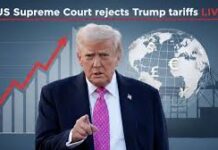The once-formidable partnership between President Donald Trump and billionaire entrepreneur Elon Musk has erupted into open warfare, as both men exchanged personal attacks on Thursday in a dramatic breakdown that could carry major political and economic consequences.
The falling-out marks a remarkable collapse of a high-profile alliance that had helped fuel Republican victories and placed Musk in a prominent policymaking role within the Trump administration. But tensions that had been simmering for days boiled over after Musk publicly denounced Trump’s signature tax-cut and spending bill, an expansive package that Musk called a “disgusting abomination.”
Trump, who had initially remained silent on Musk’s campaign to kill the legislation, finally lashed out during an Oval Office press event, declaring he was “very disappointed” in his former ally. “Look, Elon and I had a great relationship. I don’t know if we will anymore,” Trump said, in what many observers saw as a formal end to their collaboration.
Just moments later, Musk responded in real time on X, the platform he owns, asserting: “Without me, Trump would have lost the election.” He claimed his nearly $300 million in political donations and strategic support during the 2024 campaign had been pivotal to securing Trump’s return to the White House and Republican control of Congress.
The rhetoric intensified further when Trump posted on Truth Social that cutting off government subsidies and contracts to Musk’s companies, including Tesla, SpaceX, and Starlink, would be the “easiest way to save billions and billions of dollars” from the federal budget.
Musk immediately retaliated online, replying “Yes” to a post calling for Trump’s impeachment, a provocative stance given that Republicans, backed by Musk’s prior donations, currently control both chambers of Congress.
Market Fallout and Political Risk
Tesla’s shares nosedived more than 14% by the end of trading Thursday, wiping out roughly $150 billion in market value in the company’s worst single-day loss ever. Investor concerns grew as Musk threatened to begin decommissioning the Dragon spacecraft, the only U.S. vehicle currently capable of transporting astronauts to the International Space Station. Although Musk later walked back the threat, the warning underscored the potential national security risks tied to the feud.
The breakdown also exposes rifts within the Republican Party, with Musk’s outspoken opposition to the spending bill amplifying internal dissent. Nonpartisan analysts estimate the legislation could add between $2.4 trillion and $5 trillion to the already $36.2 trillion national debt—fueling criticism from fiscal conservatives and raising doubts about its passage in the Senate.
“Such a public rupture between two of the GOP’s most powerful figures could imperil midterm prospects,” said a Republican strategist close to both camps, speaking to Reuters on condition of anonymity. “Elon really was a significant portion of the ground game this last cycle. If he sits out the midterms, that worries me.”
A Tumultuous History and an Uncertain Future
The clash is all the more stunning given Musk’s recent role as head of the Department of Government Efficiency (Doge), where he led an aggressive campaign to slash federal spending, dismantle entire agencies, and lay off thousands of government workers. His tenure, though controversial, made him a symbolic face of Trump’s deregulatory agenda.
But Musk’s growing political independence, and frustration with government spending, appears to have triggered the schism. On Tuesday, he posted: “In November next year, we fire all politicians who betrayed the American people.” He has also signaled plans to scale back political donations, while his political activism has sparked protests at Tesla factories and investor concerns about his divided focus.
Despite the acrimony, hints of reconciliation surfaced late Thursday, with Musk responding “You’re not wrong” to billionaire Bill Ackman’s suggestion that he and Trump should make peace.
Still, for now, the rupture remains raw, with massive implications for government policy, space infrastructure, the 2026 midterms, and the two larger-than-life personalities at the center of it all.
Written By Rodney Mbua



















